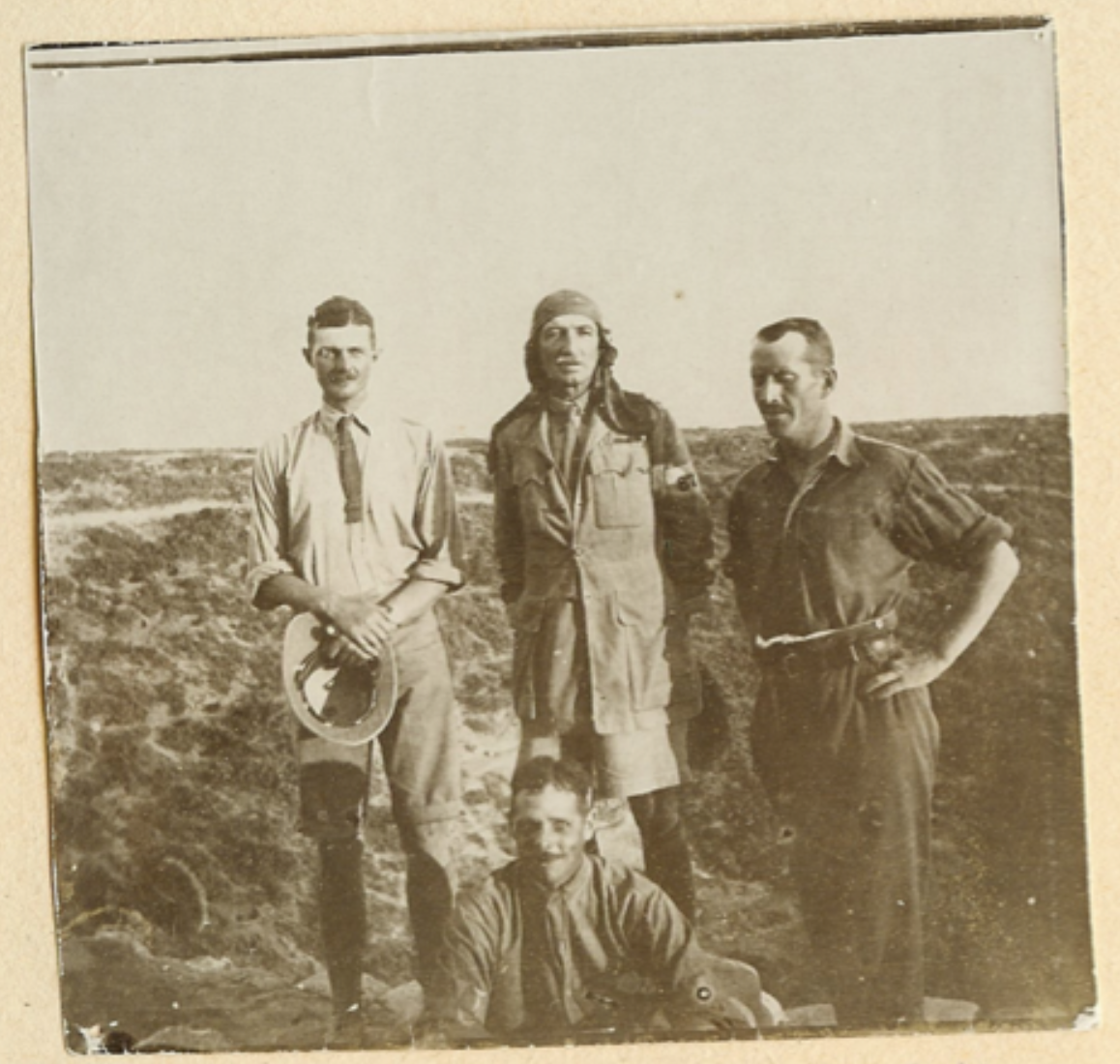25th July - No Letter
Secret diary: No entry
Official diary (25th July): No entry
Location: Dr. Corboy's house in Caherconlish.
As there is nothing much to mention about the 25th July, we thought that this would be a good opportunity to learn more about CHTL, the military man. There’s no doubt that he would have entertained the ‘lads’ with stories of his time in the trenches as ‘they spoke of their experiences in internment after the Easter rebellion of 1916’. (Auckland Star, Volume LI, Issue 184,3 August 1920, Page 5)
Steve Warburton, who is the expert on CHTL’s WW1 experiences and custodian of his letters and diaries from the 1914-1918 war has kindly written the following:
A Snapshot of CHTL’s Experiences during WW1
The man who encountered the IRA in 1920 had over 20 years’ military experience. His first ten years featured service in 3 continents but CHTL’s military career had begun with his admission to Sandhurst in 1896. He had chosen this route to a commission rather than the one taken by others who gained their commission via initially serving in militia units.
CHTL’s fight with Lynch during his capture is the only recorded literal ‘hand-to-hand’ combat of his military career. He did, however, find himself in some ‘tight spots’ at different times.
In October 1914 CHTL got his wish to rejoin his regiment. Much to his chagrin as a Staff College student he had been deployed in early August to France as a Military Disembarkation Officer in Rouen, rather than with the Royal Berkshires. He somewhat crassly – but honestly – complained to his father that the only way he would get to the front before it was all over would be if the Berkshires suffered significant officer casualties – and so it proved.
By the beginning of October the regiment’s officer casualties were beginning to mount. CHTL returned as captain of B Coy, eventually catching up with the Berkshires at Metz Farm before the Berkshires joined the ‘Race to the Sea’, eventually deploying round Ypres on October 21st. Lucas would find himself back here in August 1916 as his Brigade recovered from 40% casualties in the battle of the Somme.
Through October and November 1914 the German Armies tried to break the Allied line at Ypres. The fighting increased in intensity as German attacks were met with increased desperation by the Allies. The Berkshires frequently being deployed to plug gaps in the line.
The week October 26th – November 2nd was a challenging one for CHTL – but it marked him out as not only a man with leadership potential, but one who could ‘step up’ when required.
October 26th.-Poor Steele blown to a jelly in the evening [of the 25th] by a ‘Black Maria’, while trying to reorganise his company behind his trenches. Gross hit in the knee by a bit of shrapnel next morning (26th), leaving me the only officer left out of the two companies.
Personal Diary
October 31st.--Last night the Company moved into trenches on top of the ridge as a reserve. - During the morning two Companies were sent off as a reserve to the 1st Division. We lay in the Polygon wood near the Race Course till 3.30 pm., and were then sent to clear some Germans out who had broken through west of Cheluvalt. As we approached the railway line just west of the town we were met with a heavy fire from the embankment. We charged and got there all right. Here we lay in an exposed position till midnight. We had several casualties including three Platoon Sergeants, and I got a bullet through my clothes...It was bitterly cold and damp lying out on the embankment.
Personal Diary
November 2nd Pressing through some houses, I came round the corner of one and saw about eight Germans falling in and two or three more tumbling out of the door not five yards away. We then saw Germans running in all directions all round us.
Finch went off to hospital after we got in, so I as senior officer went off to the Brigade Headquarters for instructions, as there now seemed to be no protection between us and the Germans. Later I heard that Colonel Graham had been badly wounded, away with the 6th Brigade, so that now I am in command of the Battalion.
Personal Diary
November 3rd Isaac sent up some hot water and washing kit so I got a bit of a wash. Find I have got a small cut across both shoulder blades as a result of the 31st. A shell pitched on our telephone dugout, wounded one of the operators and interrupted communication. Not many casualties. Bennett and Waghorn joined from the base. Companies now only eighty strong.
Personal Diary
The danger did not disappear for the Berkshires but they were a shadow of the 1000-strong battalion that had left Reading in August. CHTL had proved his ability to perform his role under pressure and to survive – the graze across his shoulder blades would not be the only close call.
In January 1915 CHTL became Brigade Major of the newly-created 87th Brigade, 29th Division which would muster in Rugby, arriving from China and India. He recounts one of the most formidable challenges of his career in a letter to his father on January 9th:
My dear Father,
I got down to Salisbury this afternoon, and am on my way straight back to Rugby where my headquarters will be at the Grand Hotel. I have no general, office, regulations, stationary, clerks, or military funds of any kind, and of course know nothing of the work.
The battalions start arriving on Monday 3 at Rugby and one at Coventry. I have to arrange for their billeting and mobilisation. Having no general I have no authority of my own, and I can only hope the COs will be amenable.
I have no doubt it will work out all right, and a staff will eventually collect. There is no prospect of leave just at present.
CHTL writes to his father (9th January 1915)
The other two Brigade Majors of the Division – Costeker and Frankland – died within hours of landing at Gallipoli on April 25th. May 1st featured CHTL’s ‘closest call’ of the campaign.
Early in the morning at breakfast they shelled the small farm we had taken over as Brigade headquarters. Fortunately the General had gone round the firing line so breakfast was put off, and everyone was outside except myself, mine and the general’s servant. I had been writing up the war diary & stopped in the middle to go into the next room to wash. I heard two shells go over, thought they were shrapnel and did not worry. The next one burst in the room I had left, the front portion came through the wall between my servant and myself as I was handing him my razor, a bit hit him between the eyes and penetrated just short of the brain. The shell had come through the roof 2’ above where I was sitting a moment before. The General’s servant was kneeling in a corner of the room making his bed and was not touched except for torn clothes etc. All my worldly possessions were blown to bits, the most valuable being a fleece-lined waterproof, waterproof sheet, air cushion and camera. Brigade headquarters removed to dug out in trench 100x NW.
Personal Diary
CHTL was a survivor – of the 500 or so officers of the 29th division who landed in the Dardanelles in on April 25th 1915, he was one of the 13 who continually served with the Division in that campaign without being killed or evacuated (wounded or sick). In contrast to the limits of the secret diary of his IRA captivity, CHTL wrote 60,000 words in his Gallipoli diaries (January 1915 – January 1916). There is no way to do them justice here, but they are available online at http://gallipolifirstandlast.blogspot.com/ for you to read at your leisure.
By June 1916 CHTL was in place with his Brigade preparing for the Somme attack. His days of charges, patrols and fighting retreats were over, and became more ones of dugouts, maps, planning, early-morning trench inspections and reports.

Back to Ireland tomorrow and a letter to Poppy…

